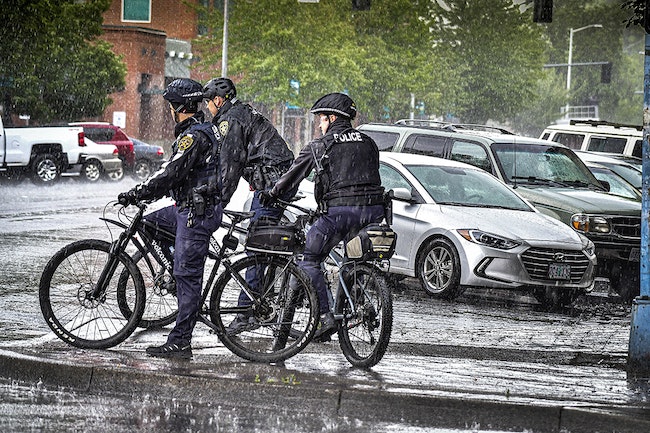
Salem police officers on bike patrol endure a downtown that hit the March for Floyd event on Saturday, June 6. (Ron Cooper/Salem Reporter)
Salem on Friday met two finalists for a job that will guide the future of the Salem Police Department.
Police Chief Jerry Moore is retiring after 15 years at the helm.
Trevor Womack and Malik Aziz appeared for a town hall style interview in Salem City Council chambers, fielding questions from a moderator who appeared by video.
Both have decades of experience in law enforcement, come from departments much bigger than Salem’s and say they learned the profession from progressive leaders.
Womack is with the Stockton Police Department, where he has been the deputy chief since 2012. He’s been with the department since 1992.
Malik Aziz has been a major at the Dallas Police Department since December 2017. He’s been with the department since 1992.
Here is a summary of how they answered questions Friday. City spokespeople didn’t respond to an email Friday afternoon asking when the finalist will be chosen or what the final salary will be.
The Salem Police Department has a $48.9 million budget and 241 employees, 189 of which are sworn officers.
 Malik Aziz is a candidate for Salem police chief. (Courtesy/city of Salem)
Malik Aziz is a candidate for Salem police chief. (Courtesy/city of Salem)
 Trevor Womack is a candidate for Salem police chief. (Courtesy/city of Salem)
Trevor Womack is a candidate for Salem police chief. (Courtesy/city of Salem)
Why Salem?
Aziz said Friday was his first time in Oregon and “it stood out as a really beautiful place.”
He said he found Salem to be a city without all the hassles of a big city and a lot of parks.
Womack said Salem is a “beautiful community that’s growing, it’s vibrant.”
He also cited Salem’s proximity to the coast and the mountains.
First six months on the job
Aziz said in his first six months, he would find a way to pay for body-worn cameras for officers. The Salem Police Employees Union called for body cameras this summer, but the hefty price tag has stalled efforts in the past.
He also said he would look at the school resource officer program with school administrators to determine if they want police in schools and what role they should play.
Aziz said he would look at the department’s use-of-force protocols.
To work with Salem’s underrepresented and communities of color, Aziz said police can’t criminalize addiction, need to keep seniors from getting scammed and make sure there are officers who speak Spanish.
Womack said in his first six months he would try to meet five key objectives. Those include earning legitimacy from a variety of community interests, establishing clear expectations for staff and the department, assessing the organization to cull out its strength and weaknesses, coming up with a new idea or policing philosophy and positioning himself to lead with a new shared vision.
He said there are four groups he wants to address: city leaders, the community, leaders at the police department and collaborative leaders within the community, like those who works to end chronic homelessness.
“From day one I’m going to continually express my foundational values as a leader: Teamwork, trust, transparency, professionalism and excellence.”
He said he would bring two elements or “pillars” to the department – policing that’s data-driven and using evidence-based approaches and policing that emphasizes character values and trust within the community.
Handling people in mental health crisis
Aziz said a program in Dallas is similar to what community members have been calling for in Salem, which “engaged paramedics, mental health workers and police” to respond to thousands of mental health crisis calls a month. He said the pilot program was funded by a Dallas nonprofit.
He said he would advocate for a similar program in Salem, because “bringing those types of programs could be transitioning to not having police there.”
Aziz said the department needs to train officers in better de-escalation techniques and to stay up on best practices.
He said to handle people experiencing crisis, officers need to treat the cause of the problem, whether it’s substance abuse or mental illness.
“Address it from those angles,” he said. “No one in that place should be criminalized.”
Womack said handling mental health calls starts with training officers to recognize symptoms of someone with mental illness and de-escalate the situation.
However, he said there needs to be less reliance on law enforcement to respond to those types of calls.
“There’s a way to partner together and coordinate that response,” he said.
Womack said Salem police could explore a mobile crisis response unit.
The agency assigns three officers to the Mobile Crisis Response Team, which pairs a trained counselor and an officer to respond to those in crisis in Marion and Polk counties.
Those team members, and about a quarter of Salem’s officers, receive 40 hours of crisis intervention training, which includes de-escalation. The state Department of Public Safety Standards and Training also offers hours of de-escalation training.
Recruits receive roughly 1,600 of training before they’re allowed to respond to calls on their own.
Handling protests
Asked how he would handle demonstrations, like the protests earlier this summer when Salem police used tear gas for the first time, Aziz said as a leader he would determine if officers are properly trained.
He said officers need to be briefed on who has the ultimate say when approving the use of “less-lethal” munitions like pepper balls or rubber bullets.
Aziz said as chief, he wouldn’t approve tear gas unless situations were really dire.
Womack said he created the first crowd control team in his department. To be successful, he said, leaders need to “place only your best people in those situations.”
He said his department hasn’t had to use tear gas.
Womack said his profession needs to move away from the old model of escalated force and move into a contemporary model of negotiated management.
He said police shouldn’t have a heavy show of force and need to be “surgical” about how they approach removing people engaging in criminal behavior from a crowd.
As an example, he said if someone throws a rock in an unruly crowd, police shouldn’t gas the crowd, but instead find a way to remove that person.
SUPPORT ESSENTIAL REPORTING FOR SALEM – A subscription starts at $5 a month for around-the-clock access to stories and email alerts sent directly to you. Your support matters. Go HERE.
Have a tip? Contact reporter Saphara Harrell at 503-549-6250, [email protected] or @daisysaphara.










